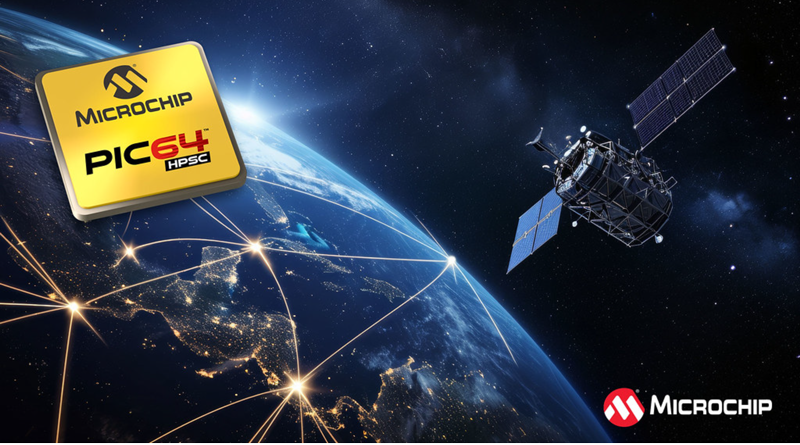Microchip Unveils the Industry’s Highest-Performance 64-bit HPSC Microprocessor (MPU) Family for a New Era of Autonomous Space Computing.
A new technology ecosystem has also been launched as Microchip collaborates with over a dozen system and software partners to accelerate PIC64-HPSC adoption.
The world has changed dramatically in the two decades since the debut of what was then considered a trail-blazing space-grade processor used in NASA missions such as the comet-chasing Deep Impact spacecraft and Mars Curiosity rover vehicle. A report released by the World Economic Forum estimated that the space hardware and space service industry is set to grow at a CAGR of 7% from 2023’s 330 billion dollars to 755 billion dollars by 2035. To support a diverse and growing global space market with a rapidly expanding variety of computational needs, including more autonomous applications, Microchip Technology (Nasdaq: MCHP) has launched the first devices in its planned family of PIC64 High-Performance Spaceflight Computing (PIC64-HPSC) microprocessors (MPUs).
Unlike previous spaceflight computing solutions, the radiation- and fault-tolerant PIC64-HPSC MPUs, which Microchip is delivering to NASA and the broader defense and commercial aerospace industry, integrate widely adopted RISC-V® CPUs augmented with vector-processing instruction extensions to support Artificial Intelligence/Machine Learning (AI/ML) applications. The MPUs also feature a suite of features, industry-standard interfaces, and protocols not previously available for space applications. A growing ecosystem of partners is being assembled to expedite the development of integrated system-level solutions. This ecosystem features Single-Board Computers (SBCs), space-grade companion components, and a network of open-source and commercial software partners.
“This is a giant leap forward in the advancement and modernization of the space avionics and payload technology ecosystem,” said Maher Fahmi, corporate vice president of Microchip Technology’s communications business unit. “The PIC64-HPSC family is a testament to Microchip’s longstanding spaceflight heritage and our commitment to providing solutions built on industry-leading technologies and a total systems approach to accelerate our customers’ development process.”
The Radiation-Hardened (R.H.) PIC64-HPSC RH is designed to give autonomous missions the local processing power to execute real-time tasks such as rover hazard avoidance on the Moon’s surface, while also enabling long-duration, deep-space missions like Mars expeditions requiring extremely low power consumption while withstanding harsh space conditions. For the commercial space sector, the Radiation-Tolerant (R.T.) PIC64-HPSC RT is designed to meet the needs of Low Earth Orbit (LEO) constellations where system providers must prioritize low cost over longevity while also providing the high fault tolerance vital for round-the-clock service reliability and the cybersecurity of space assets.
In 2022, NASA selected Microchip to develop a High-Performance Spaceflight Computing processor that could provide at least 100 times the computational capacity of current spaceflight computers. This key capability would advance future space missions, from planetary exploration to lunar and Mars surface missions. The PIC64-HPSC is the result of that partnership. Representatives from NASA, Microchip, and industry leaders like Northrop Grumman will share insights about the HPSC technology and ecosystem at the IEEE Space Compute Conference 2024, July 15–19, in Mountain View, California:
Comprehensive Ecosystem
Microchip’s new PIC64-HPSC MPUs will be supported by a comprehensive space-grade ecosystem and innovation engine that encompasses flight-capable, industry-standard SBCs, a community of open-source and commercial software partners, and the implementation of common commercial standards to help streamline and accelerate the development of system-level integrated solutions. Early members in the ecosystem include SiFive, Moog®, IDEAS-TEK, Ibeos, 3D PLUS, Micropac, Wind River®, Linux Foundation, RTEMS, Xen, Lauterbach®, Entrust®, and many more. For information, visit Microchip’s PIC64-HPSC MPU ecosystem partners webpage.
The Microchip will also offer a comprehensive PIC64-HPSC evaluation platform that incorporates the MPU, an expansion card, and a variety of peripheral daughter cards.

